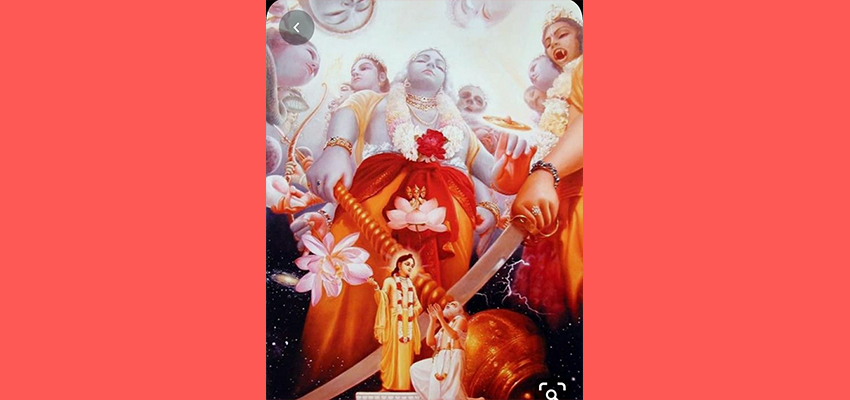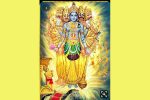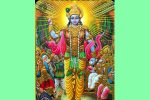NAME 13
Avyayaḥ अव्ययः
Brahman is beyond modification. He is eternal. BṛhadāraṇyakaUpaniṣad (IV.iv.25) says, “Birth-less Brahman is non-decaying and immortal.” This also proves the point that the Brahman is not born. When there is birth, there has to be death. In the initial stages of spiritual pursuit, this is the significant factor that differentiates the Brahman from other beings. Any object can be recognised by ordinary means i.e. senses. Brahman can be realised only through negations and affirmations. When one stops identifying other things, identity with the Brahman begins to dawn.
Bhagavad Gita (VII.25) says, “Veiled by My yogamāyā I am not manifest to all. Hence these ignorant men fail to recognise Me, the unborn and imperishable Supreme.” Yogamāyā is the divine potency by which the Brahman conceals Himself.
१३. ।।ॐ अव्ययाय नमः।।
13. Om Avyayaḥ Namah
(13) Avyaah –“Vyaya” means destruction; destruction cannot be without change; therefore, that which is “without destruction” (Avyayah) is the changeless. The Indestructible, and therefore, changeless, can never have any modifications (Parinaama). For, modification is but the death of a previous condition and the birth of a new condition. The Eternal and the Immutable (Avyayah) is the Supreme Sat-chit- aananda, and every other thing and being come under the hammer or change. The medium in which all these changes are sustained is Brahman, the Immutable. The Upanishads glorify Him as “Ajaro Amaro Avyayah”-without old age, death or change.
INTERPRETATION GUIDED BY SANT VANI (WORDS OF SAINTS)
Avyayaḥ
The one free from decline and destruction.
Vyaya means change, decline and destruction. The nature of the human body is subject to vyayaa – disease, ageing and death. In fact, when Buddha was Gautama, he was moved so much by seeing the plight of people subject to changes, disease, ageing and death that he chose to find out the reality underlying it.
The Lord is avyaya, free of vyaya. He does not undergo any change, any decline and destruction. He is nitya and avināśhī. He does not undergo any kind of modification. Just Is. In Bhagavad Gita 2.17, the second line of the verse says – No one can bring about the destruction of that which does not change. The Lord is that avyaya.
What can change? Only that, which has a form, in time, can change. That which is free of form, does not undergo any change. The form itself is a kind of an attribute. What is a pot? A pot is that which has pot”ness”. Then, to what does the pot”ness” belong? The pot”ness” does not belong to the pot, because the pot itself does not exist. What is there is only the clay. The potness is only the dharma, nature of a form. The form is the potness.
Now, does the potness belong to the pot or to the non-pot? When you say potness, it is only the form. This particular form is called the pot and you say it has the potness. So, the potness belongs to the non-pot alone. Here the non-pot is clay. However, the potness is not the attribute of the clay. As it cannot be attributed to anything else, we have to say that the potness is only an incidental attribute of the clay. Therefore, whether that incidental attribute is there or not, the clay ever remains avyaya, unchanging. The clay remains as clay alone. So too, whatever may be the incidental attributes, Brahman remains as paramatma alone, without undergoing any change.
What differenciatesJivatma from the Parmatma is the mind and its modifications leading to vrittis when housed in a world of names and forms. Just as potness belongs to the pot but is not the attribute of the clay, similarly the body and the mind belong to you but you are not the body and mind.
Arishadvarga or Shadripu/ShadaRipu (Sanskrit: षड्रिपु meaning the six enemies) are the six enemies of the mind.
kama — lust, craze, desire
krodha — anger, hatred
lobha — greed, miserliness, narrow mindedness
moha — delusory emotional attachment
mada — pride, stubborn mindedness
matsarya — envy, jealousy, show or vanity, and pride
These bind the soul to the cycle of birth and death and keep it confined in this material world (confines of Maya or relative existence) and make the individual soul whose primordial nature is non perishable to decay and die, being encased in the form as a result of the ripened fruits of actions accrued through many lifetimes passing through 84 lakh yonis. Especially the first three are said to pave the way towards hell which is our own mind keeping us away from that which is our true nature – that which is unchanging – the pure soul (atma)- the Higher Self. The first two bring about difficult experiences we face in our lives and enter into the endless cycle of cause and effect.
“Kama KrodaschaLobhaschaDeheThishtanthiTaskarah Jnana Ratno-paharayaTasmatJagrataJagrata.”
Desire, anger, greed, attachment, pride, jealousy—these dacoits are residing within your own body. They are not outside. They are residing as fifth column enemies within you. And, why are they there? To loot you of the Jnana-Ratna, to rob you of the precious gem of spiritual wisdom or atma-jnana, to loot you and deprive you of the precious gem of Self-awareness and make you forget your Self and weep and wail and be in ignorance. In order to deprive you of this jewel of atma-jnana, they are there. Therefore, oh man, oh Sadhak, Jagrata, Jagrata. Beware, beware. In this way, from the submerged level of the chitta or the deep within, various samskaras and vasna are brought into activity.
—Aḍi Shankaracharya
Atma is not subject to change, decline and destruction. It is avayayah – non perishable. To be aware of the true nature of the Param Tatva within is being Self aware of the oneness with Paramātmā.
He, who is not subject to “vyaya” i.e. change or mutation. He is beyond the vicissitudes of normal life-experience – not ageing, not decaying, not changing, never dying.
Śaṅkara and Parāsara give completely different interpretations for this name. This post elaborates Śaṅkara’s interpretation but have also shared Parāsara’s interpretation at the end of the post.
In the बृहदारण्यक उपनिषद्, Bṛhadāraṇyaka Upaniṣad, the following verse describes the Supreme Self” as that which is
Verse 4.4.25:
स वा एष महानज आत्माजरोऽमरोऽमृतोऽभयो ब्रह्म; अभयं वै ब्रह्म; अभयं हि वै ब्रह्म भवति य एवं वेद ॥ २५ ॥ इति चतुर्थं ब्राह्मणम् ॥
sa vā eṣa mahānaja ātmājaro’maro’mṛto’bhayo brahma; abhayaṃ vai brahma; abhayaṃ hi vai brahma bhavati ya evaṃ veda || 25 || iti caturthaṃ brāhmaṇam ||
That great, birth-less Self is un-decaying, and immortal. It is because it is birth-less and undecaying, therefore It is undying and free from all conditionalities and effects of birth and associated conditions of desire, work, delusion, etc., which are but only forms of death. Hence the self is fearless. Brahman alone is that birth-less, un-decaying, immortal, fearless “Self”.
Swami Vivekananda in his work Jnana yoga has this to say about the infinite being:
“To say that the infinite changes in any way is absurd; it cannot be… this infinite unit is unchangeable, immovable, absolute…”
Parāsara Battar gives this name a completely different meaning. According to his commentary the word AVYAYAḤ: is derived from “na veeyate” meaning “He, who does not turn away any Ātmā that has made the great effort to cross the ocean of samsāra and reached the lotus-feet of that supreme being.”
He, who is not subject to “vyaya” i.e. change or mutation. He is beyond the vicissitudes of normal life-experience – not ageing, not decaying, not changing, never dying.
“The blows from the hammer of time can crack your skin, it can make your bones fragile, but it can’t dent your soul, your heart. The brain may slow down but the wisdom and peace you carry within are ageless.
As long as the desire to live is alive, so long as there’s something you aspire to learn, you are not old. Besides, the joy to just sit under a tree and read your favorite book without the stress to please some boss at work the next day, the time to step out at night and watch the stars rather than having your eyes droop from binge-watching Netflix, these little but profound joys are best experienced when we have aged a little. As with vintage wine or cheese, some tastes only evolve with time, in time.
Life is one such elixir of bliss and beauty. For the one who knows how to live, it only gets better with each passing moment. All you have to do is to keep your dream alive. Care about something.” – Om Swami



